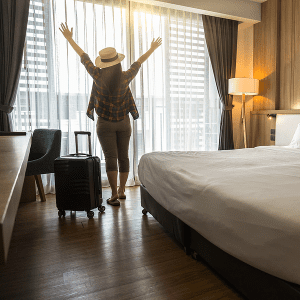 The top factors influencing a guest’s choice in hotel accommodation according to STR Research in May 2021 are: location, price and value for money, cancellation policy, previous stay, positive reviews/personal recommendations.
The top factors influencing a guest’s choice in hotel accommodation according to STR Research in May 2021 are: location, price and value for money, cancellation policy, previous stay, positive reviews/personal recommendations.
Although most factors have been in the top 5 before COVID-19, the way each affects the booking decision has changed. By focusing on these five factors, independent hotels have the competitive advantages to steal share from branded hotels.
1. Location
COVID-19 has changed how far guests are able or willing to go for their next vacation. After so many restrictions, travelers are open to discover new destinations within their own country. When searching for hotels, guests are not hesitating between neighborhoods anymore but often between cities that may be miles apart. Independent hotels need to leverage their ability to update content quickly on all digital platforms and appeal to the guest’s desire for a new adventure.
When a guest is browsing through cities, they are bound to start on the websites of the Destination Marketing Organizations. It is key to actively work with their DMOs and CVBs to provide relevant content and be included in campaigns or highlights.
Additionally, as cities re-open, some businesses closed, some changed their offering and others are new to the market. A hotel that has a dedicated page with an up-to-date list of open attractions and restaurants with short descriptions will be of great value for guests who are unsure of their destination.
Finally, independent hotels have much more flexibility about partnering with local businesses. Cross-selling or referring local restaurants, breweries/wineries, spas, small souvenir shops resonate with guests’ craving for new local experiences.
2. Price and value for money
While guests may not be able to travel far from home, they need to “escape” from their routine now more than ever. As part of that escape, the hotel is no longer perceived as a place to sleep but very often as a vital anchor of the guest stay and their perception of the overall trip. As a result, independent hotels need to connect to the emotional side of guests and pose themselves as the opposite of “bland branded hotels”.
Hotels can tell a story to guests through design across all common spaces and bedrooms, but they should not stop there. The personality of a hotel needs to transpire throughout the guest experience (i.e. room type name & descriptions, offers, verbiage, hotel history description) and employees need to be trained to share the hotel story with guests.
In addition to a clear identity, an independent hotel’s strength lies in its flexibility and its ability to adapt quickly to match guest expectations. This does not mean creating hundreds of packages but structuring a clear offering to cater to each guest type (i.e. AAA, staycations, regional drive-in markets, independent contractors, families) and promoting seasonal offers that are in line with the hotel identity.
3. Cancellation policy
Hotels have been eager to go back to prepaid non-refundable rates most likely because it gives them some semblance of having secure business on the books. But there are other ways to reduce the cancellation rate: connect with guests.
When guests have no connection to a hotel, they are likely to continue browsing and switch to a comparable hotel if the price is better. By definition, guests who book a non-branded hotel are looking for an experience and expecting to connect with the hotel prior to arrival.
As employees are stretched and are not able to call each guest, this is when technology can help:
- Create an email template that welcomes guests, recaps the hotel key features and the city main attractions. That template can have different versions and sent based on key criteria (i.e. number of children, rate code, arrival dates…).
- Create automatic reports for suite bookings & long stays made the previous day so a team member can reach out. Although guests have been more and more comfortable booking higher room types online, they are likely to cancel if they do not talk to someone at the hotel prior to arrival.
4. Previous stay
The number of staycations and drive-in getaway weekends increased exponentially due to COVID-19. These types of trips have been decreasing as cities re-open but they will remain a major feeder for hotels. For independent hotels, these guests should be considered as their loyalty program and put in place strategies to capture repeat stays.
Here are a few examples to integrate in a year-round strategy for local & regional guests:
- Offer discounts for hotel stays for regular patrons of the hotel restaurant/bar or spa.
- Sell gift cards online for a value with seasonal verbiage
- Have a geo-targeted offer for guests living in the immediate areas
5. Positive reviews/personal recommendations
Contrary to brands that sometimes focus more on their internal survey systems, independent owners need to put all their efforts and attention to Google reviews, Tripadvisor, Yelp and OTA rankings. Guests who experienced emotions during their stay are more likely to leave a review, and reviews from a guest experience any outlets of the hotel will make a difference. Another reason to pamper local guests.
Other factors
Although only numbers 6 & 7 on the list, guests are still taking into consideration Health & safety factors (Positive perceptions of cleanliness, Evidence of / adherence to good social distancing) in their decision-making process. As guests will always have this “fear of the unknown” when booking a non-branded hotel, the best tool for an independent hotel is a clear and detailed communication (i.e. FAQ page, information on the confirmation email, updated information on all channels).
Taking advantage of these factors as an independent hotel
Focus on these take-aways to make a difference for your independent hotel in the recovery:
- Guide the guest through the planning of their whole trip.
- Create an environment that has a clear identity to allow the guest to escape.
- Connect with the guests as soon as they booked the hotel.
- Capitalize on staycations, outlet patrons, weekend getaways to increase the number of repeat stays and reviews.
- Update, update, update: having the flexibility of an independent hotel is only a differentiator if the hotel uses it to stay relevant for guests.















